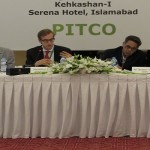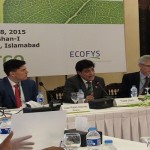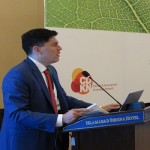National workshop on renewable energy solutions for Sialkot’s industrial sector in Pakistan is organized by PITCO.
PITCO organized the National workshop on renewable energy solutions for Sialkot’s industrial sector in Pakistan. This project is funded by CDKN. The workshop was held on 18th August 2015 in Serena Hotel Islamabad, Pakistan. The workshop was well attended by participants from industry, government departments, donor agencies and NGOs including chairmen and members of all the leading industrial sector associations from the Sialkot Chamber of Commerce, Deputy Secretary Ministry of Climate Change, CEO Alternate Energy Development Board, the German Embassy in Islamabad and the Chief Executive Officer CDKN. PITCO and Ecofys implemented this project at the request of the Ministry of Climate Change (MoCC) and the Punjab Power Development Board (PPDB) to explore solutions for meeting the energy demand of small and medium size enterprises (SMEs) in Sialkot (one of Pakistan’s most emblematic industrial hubs).
The workshop highlighted the importance of NAMAs and their potential to facilitate sustainable and reliable energy in Punjab. Stakeholders working on NAMAs and renewable energy solutions in Pakistan shared different experiences on the development of alternative energy projects in Pakistan. Mr. Juan Pablo Osornio from Ecofys presented the findings of the feasibility study for implementation of renewable energy solutions for Sialkot’s Small, Medium Enterprises (SME) operating in the sports, leather and surgical instruments sectors. Mr. Pablo identified that solar energy was a viable option but its uptake would require overcoming of barriers such as lack of technological knowhow, insufficient technical support and lack of access to finance for the SME sector.
Mr. Sam Bickersteth, the Chief Executive Officer of CDKN said that the project intended to create an expressive demand and a market for renewable energy in Pakistan. CDKN can also help build bridges between policymakers and the private sector for developing partnerships for implementation of NAMAs. The workshop proved successful in initiating a dialogue among stakeholders and raise awareness on the evolving concept of NAMA and opportunities being unfolded under global climate financial regime.




